Description
Thyme Aromatherapy
“Thyme is a symbol ‘graceful elegance’ and the Greeks used it for representing bravery, heroism and energy.”
Botanical name: Thymus Vulgaris
Origin: Spain
Source: leaves
Fall in love with Thyme essential oil if you love Mother Nature and trust its innate wisdom of healing. Thyme is such a galvanizing herb and has its use etched in the history of various parts of the planet.
History has a cluster of pages talking about the curative powers of Thyme. Almost all the continents of this world from Antarctica to Australia have used thyme for its impressive medicinal values.
In ancient Greece, public baths used herb-scented steam, and herbs, according to their significance, were rubbed onto specific body parts of the bathers. Mint the scent of strength, was rubbed onto the arms, while thyme, the symbol of courage and virtue, was rubbed onto a man’s breast. During the Middle Ages, ladies embroidered thyme on scarves they gave to their knights before they departed for the Crusades which supported the belief that Thyme, like Rosemary, was a herb of fidelity.
In today’s fast-paced, complex world there are often occasions where we are called on to display courage. Sometimes it is physical courage, while at others it is moral or emotional courage, but regardless of the circumstances, it is often that a drop or two of Thyme in the blend will help support one in the time of need. I have also found Thyme to be a great addition to blends that are created to provide support and protection.
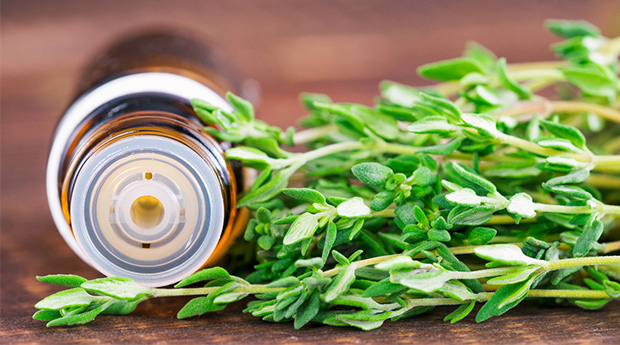
This woody, herbaceous essential oil works well in natural skincare remedies, pain aids, and around the house. Below are some of the most popular uses of thyme essential oil.
Add Thyme Essential Oil to a Bath
Adding thyme essential oil to a hot bath can aid respiratory irritation. To incorporate this oil into your bath, mix 1-3 drops into a carrier oil like sweet almond, or jojoba, and add the combination into bath water.
Apply Thyme Essential Oil to Your Skin
When diluted properly, thyme essential oil can be used topically. To help soothe the skin and improve acne, add 1-2 drops into your favorite facial cleanser or unscented lotion.
Thyme Essential Oil Aromatherapy
For aromatherapy, add 3-5 drops of thyme essential oil into a diffuser, or into 2-3 cups of hot water. Diffusing thyme essential oil is thought to aid in respiratory health, and even boost the immune system.
The oil can be used diffused on its own, or combined with other herby scents like rosemary or marjoram.
Natural Thyme Essential Oil Cleaning Solution
Thyme essential oil’s antimicrobial and antiseptic properties make it an ideal ingredient in natural cleaning products. Add 5-10 drops into a spray bottle filled with water. Shake and spray the mixture over surfaces like countertops, and tables before wiping them down.
Hot Thyme Essential Oil Compress
A hot compress can help treat pain arising from injuries, cramps, sprains, and sore muscles. To make a hot compress with thyme essential oil, fill the sink with warm or hot water. Add about 4 drops of essential oil into the water and place a folded towel on the surface of the liquid. The oil and water mixture will soak into the towel, which can then be placed onto the area being treated.
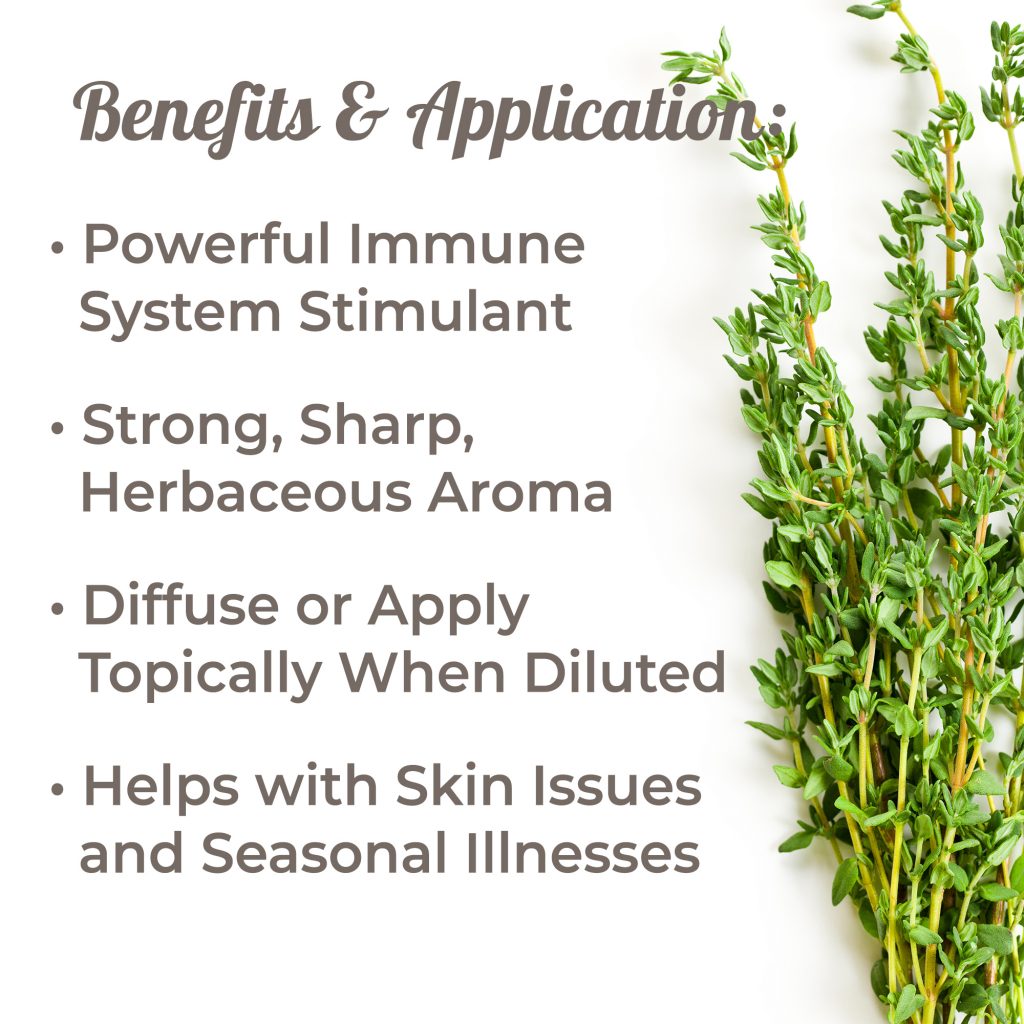
General properties
- antispasmodic
- antiviral
- digestive
- stimulant
- stomachic
- tonic
- warming
Blends well with
- bergamot
- geranium
- lemon
- melissa
- rosemary
- sandalwood
- marjoram
General uses
- Acne
- Anxiety
- Arthritis
- Bad breath
- Bronchitis
- Colds
- Cold sores
- Colic
- Cough
- Dementia
- Dermatitis
- Diarrhea
- Difficulty urinating
- Ear infections
- Flatulence
- Gingivitis
- Hair loss
- Laryngitis
- Liver dysfunction
- Menstrual cramps
- Oral thrush
- Premenstrual syndrome
- Sciatica
- Sore throat
- Tonsillitis
- Urinary tract infection
- Whooping cough
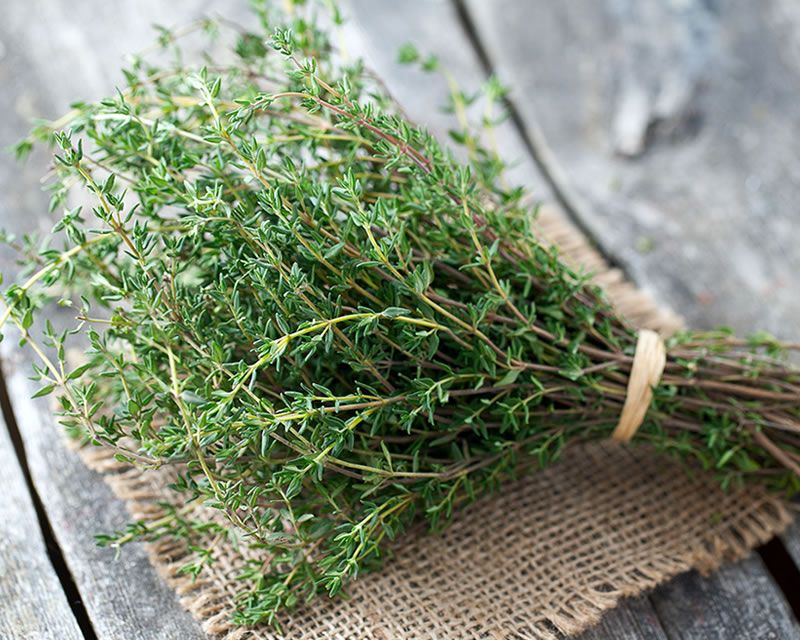
Precaution
Commonly used for cooking, thyme is considered safe when used in normal food amounts. It also appears to be well-tolerated in dietary supplement forms. However, the overconsumption of thyme may cause upset stomach, cramps, headaches, and dizziness.
Unlike most essential oils, thyme oil can also be consumed orally, albeit in limited quantities. Because the oil is concentrated, it may further amplify the known side effects. Hypotension, an abnormal drop in blood pressure, can occur if thyme oil is used in excess.
Allergy to thyme oil is also common, especially in people sensitive to plants in the mint family (including oregano, lavender, and sage). An allergy can manifest with diarrhea, nausea, and vomiting when consumed. When applied to the skin, allergic contact dermatitis may occur.
The safety of thyme oil and thyme supplements in children has not been established.
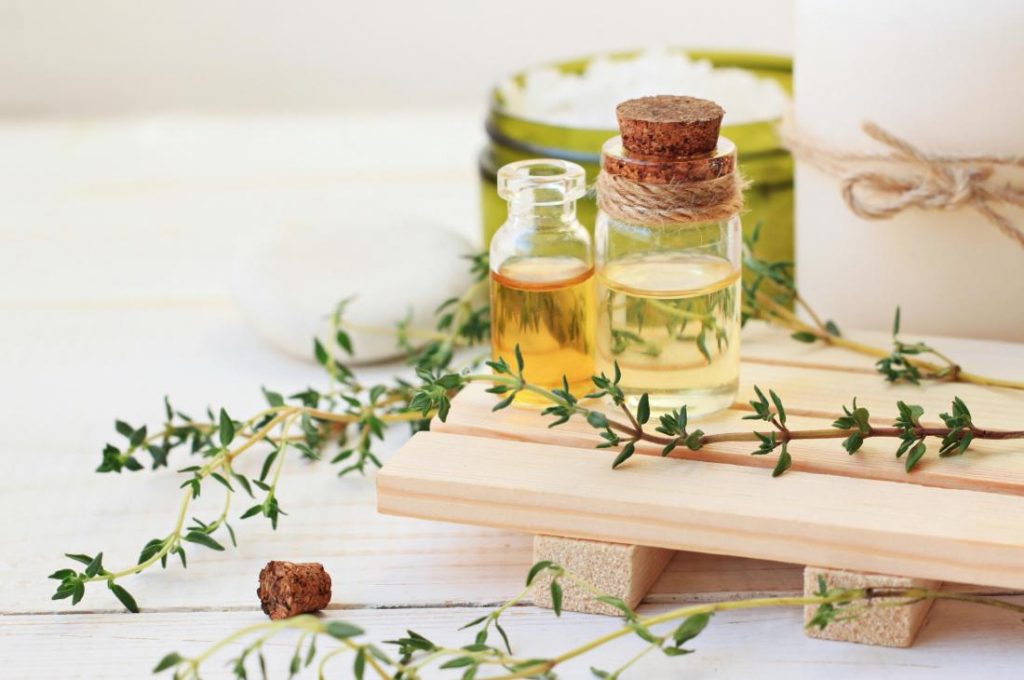

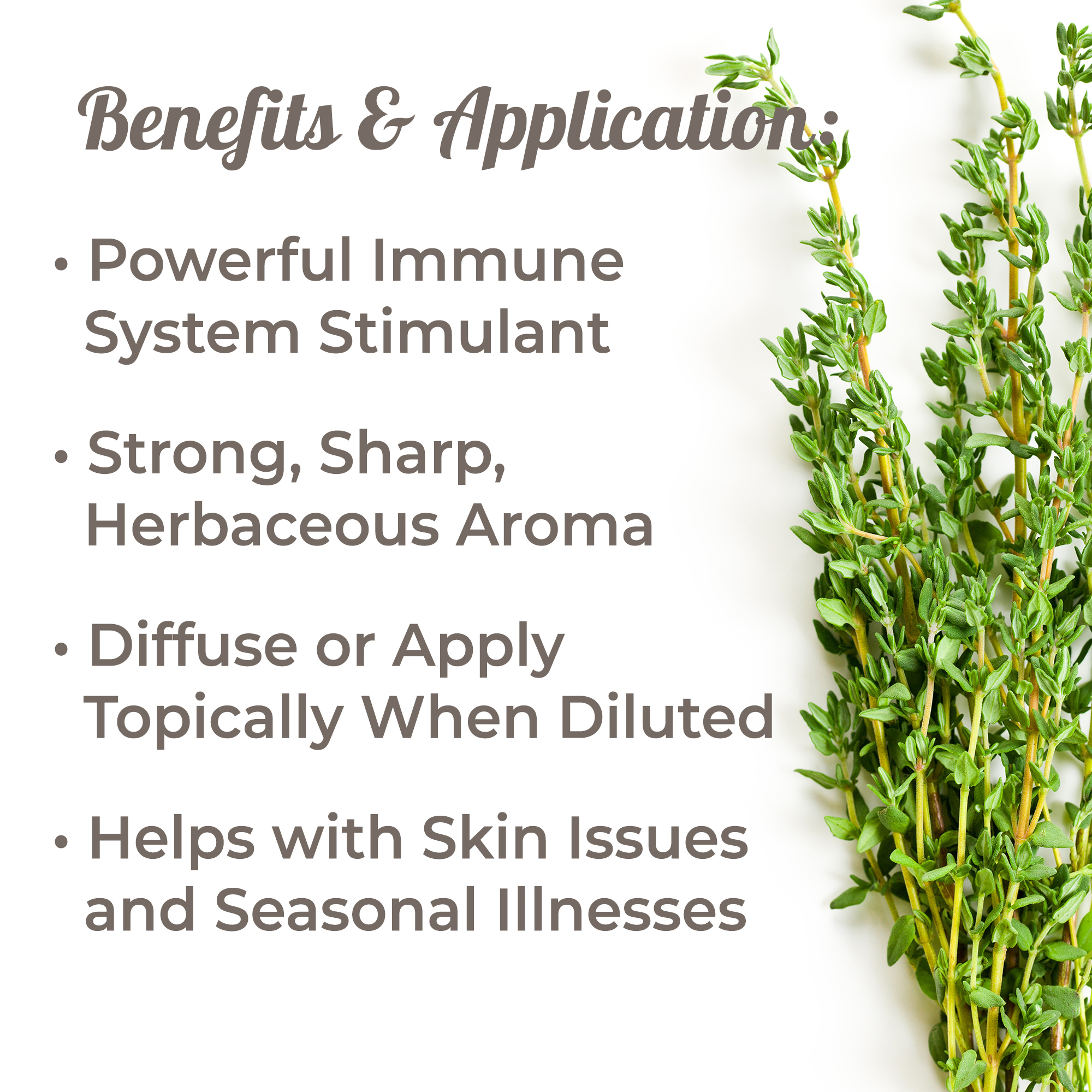


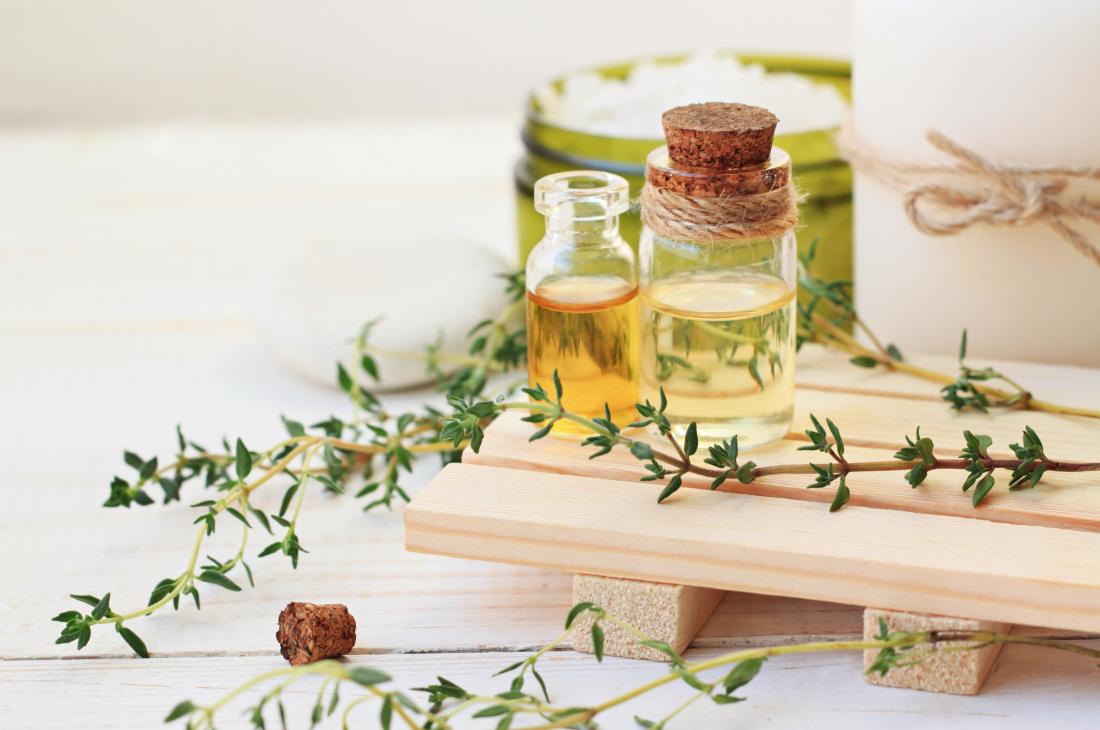
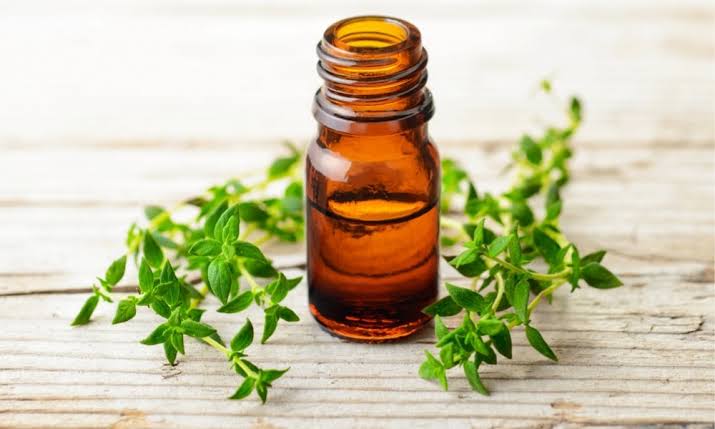


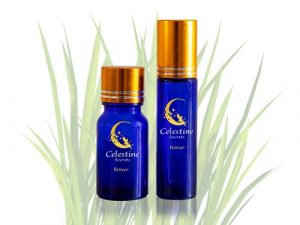
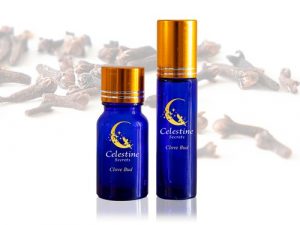
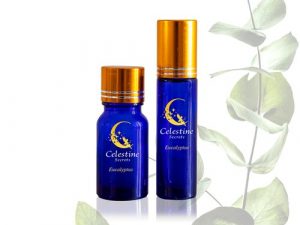
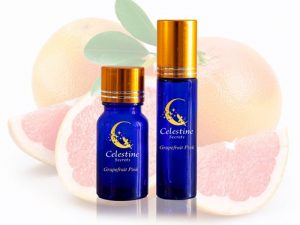
Reviews
There are no reviews yet.